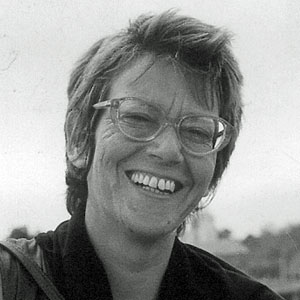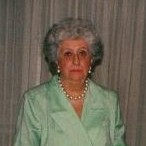
Leticia Cossettini (May 19, 1904 - December 11, 2004) was an Argentine teacher and pedagogue. [1] She was a Konex Award laureate and was knighted in Italy.

Leticia Cossettini (May 19, 1904 - December 11, 2004) was an Argentine teacher and pedagogue. [1] She was a Konex Award laureate and was knighted in Italy.
Leticia Cossettini was born in San Jorge, Santa Fe Province, May 19, 1904. She was the daughter of Antonio Cossettini and Alpina Bodello, founders of schools in Gálvez. Her sister was Olga Cossettini.
Like her parents and her sister, she followed the career path of an educator. In 1921, she worked as a teacher in a normal school in Rafaela, where she distinguished herself by her sensitivity and her artistic expressions. [2] Between 1935 and 1950, the Cossettini sisters developed a project called Escuela Serena, [3] that they applied at the Experimental School Dr. Gabriel Carrasco in the Barrio Alberdi, city of Rosario. It transformed the traditional school into a more active one with learning experiences based on education criteria. [2]
She died in Rosario, on December 11, 2004. The mayor of the city of Rafaela, Omar Perotti, signed a decree of honor and adherence "to the mourning for the death of Miss Leticia Cossettini."
In 1985, the Municipality of Rosario granted Leticia Cossettini the recognition of Illustrious Citizen. In 1986, she received the Konex Award for Humanities as one of the best teachers (without gender distinction) in Argentina. In 1990, the Republic of Italy awarded her the title Cavaliere Ufficiale al Merito. [4]

Libertad Lamarque Bouza was an Argentine actress and singer, one of the icons of the Golden Age of Argentine and Mexican cinema. She achieved fame throughout Latin America, and became known as "La Novia de América". By the time she died in 2000, she had appeared in 65 films and six telenovelas, had recorded over 800 songs and had made innumerable theatrical appearances.

Rafaela is a city in Argentina, located in the central-west region of the Santa Fe Province. It serves as the head of the Castellanos Department and is the third most populous and significant urban center in the province, following Rosario and the provincial capital, Santa Fe. The city is known as "The Pearl of the West" due to its natural, cultural, and architectural beauty. According to the socio-economic survey report by ICEDeL, the city's statistical institute, Rafaela had an estimated population of 111,000 in 2022.

The districts of the city of Rosario, province of Santa Fe, Argentina are administrative divisions created to decentralise the workings of the municipal government.

Luciana Paula Aymar is an Argentine retired field hockey player.
Leticia may refer to:

Olga Zubarry was an Argentine actress who appeared in film between 1943 and 1997. She made over 60 appearances in film, spanning six decades of Argentine cinema, but is best known for her work during the Golden Age of Argentine Cinema. Throughout the course of her career, she received four Silver Condor Awards, two Martín Fierro Awards, a Konex Foundation Award and several others for her films and television performances. She is credited with starring in the first film in Argentina which featured nudity, though only her back was shown and she stated repeatedly that she wore a flesh-colored mesh and was not truly nude.

Sara Facio was an Argentine photojournalist and publisher. She was best known for having photographed, along with Alicia D'Amico, various cultural personalities, including Argentine writers Julio Cortázar, María Elena Walsh and Alejandra Pizarnik. She co-founded the publishing house "La Azotea" alongside María Cristina Orive in 1973.

Elina González Acha de Correa Morales was an Argentine educator, scientist and women's rights activist. In her early days, she was among the first graduates of the Argentine Normal School and was a painter, winning international recognition for both her textbooks and paintings. She was the driving force behind the founding of the Geographical Society of Argentina and served as its president from its establishment until her death. She and her husband, Argentina's first renowned sculptor, Lucio Correa Morales were defenders of the land claims of the Ona indigenous people.

Professor Clara Passafari de Gutiérrez was an Argentine ethnologist, anthropologist, writer and poet.

Syria Poletti was an Argentine writer who specialized in children's literature.

Victoria Olga Cossettini was an Argentine teacher, educator, and pedagogue. She spent her career, together with her sister, Leticia Cossettini, transforming traditional schooling.
Carolina Agüero is an Argentinian ballerina, and a principal dancer with Hamburg Ballet in Hamburg, Germany.

Adela Speratti (1865–1902) and Celsa Speratti (1868–1938) were Paraguayan sisters who were instrumental in developing the educational system of the country. Born during the War of the Triple Alliance, in which their father was killed, the sisters and their mother became refugees, fleeing to Argentina. Both trained as teachers there before returning to Paraguay and establishing the first normal school in Asunción.

Dora Beatriz Barrancos is an Argentine researcher, sociologist, historian, feminist, and politician.

Diana Helena Maffía is an Argentine academic and politician.

Mirta Rosenberg was an Argentine poet and translator.

María Onetto was an Argentine theatre, film, and television actress. She received the 2011 Konex Award in entertainment for her theatrical work, and is also well known for her role in the 2006 Argentine TV series Montecristo, for which she won the Clarín and Martín Fierro Awards as best actress in drama and rising star. She also directed a localized production of rock musical Passing Strange in 2011.

Rosa Faccaro was an Argentine art critic, painter and university teacher who specialised in contemporary, Pre-Columbian and textile art. She received several awards for her work, was curator of multiple art exhibitions and was a jury member of many international and national awards. Faccaro collaborated to the artistic section of the newspaper Clarín from 1979 to 2000.

María Hortensia Lacau was an Argentine pedagogue, writer, essayist, poet, and teacher. Dedicated to teaching and pedagogy, she was a teacher at the secondary, tertiary and university levels. She taught at Colegio Nacional de Buenos Aires and Escuela Superior de Comercio Carlos Pellegrini among other institutions. Lacau gave the chaired "Commentary on Texts" in the entrance courses of the Faculty of Philosophy and Letters of the University of Buenos Aires. She is the co-author of the "Lacau-Rosetti" Spanish Manuals with which several generations of Argentines studied Spanish and literature. She was a recipient of the Konex Award and the Illustrious Citizen of Buenos Aires award.